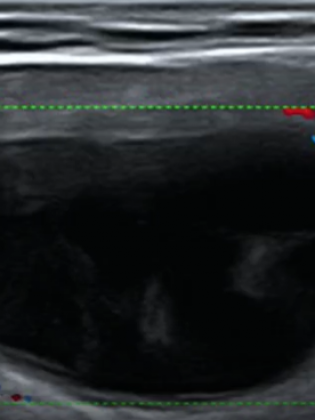Thyroid Cysts: Drainage And Percutaneous Ethanol Injection
Cystic Nodules
3 to 10% of nodules are fluid-filled, non-echogenic and very seldom cancerous. Pure, fluid-filled nodules with thin walls are thyroid cysts.
These cysts may require draining if they are large or causing discomfort. Neck discomfort (functional or cosmetic) is the main indication for performing drainage.
If the cyst has thicker walls or a small granular growth, a drainage procedure can also be used for diagnostic purposes to confirm the cyst and whether it is benign.

Drainage
Drainage offers an alternative to surgery. The drainage of a benign cystic nodule (or of a hematocele) is a relatively simple, pain-free procedure performed under the same conditions as fine-needle aspiration (sterile environment, under ultrasound guidance). The patient must sign a consent form before the procedure.
The drainage is done using a very thin needle (23 gauge) and several syringes to aspirate the fluid (which usually contains blood). The practitioner will assess the cyst’s pre- and post-procedure volume.
Percutaneous ethanol injection (PEI)
PEI is another alternative to surgery. Its purpose is to damage the vessels that are supplying the cystic cavity in order to limit recurrence.
One or two PEI procedures may be proposed. The PEI procedure does not alter or affect thyroid function.
Local outcomes are excellent: cyst volume is reduced by 90% and neck discomfort is significantly lowered.
percutaneous ethanol injection (pei) of a thyroid cyst (before and after the procedure)


